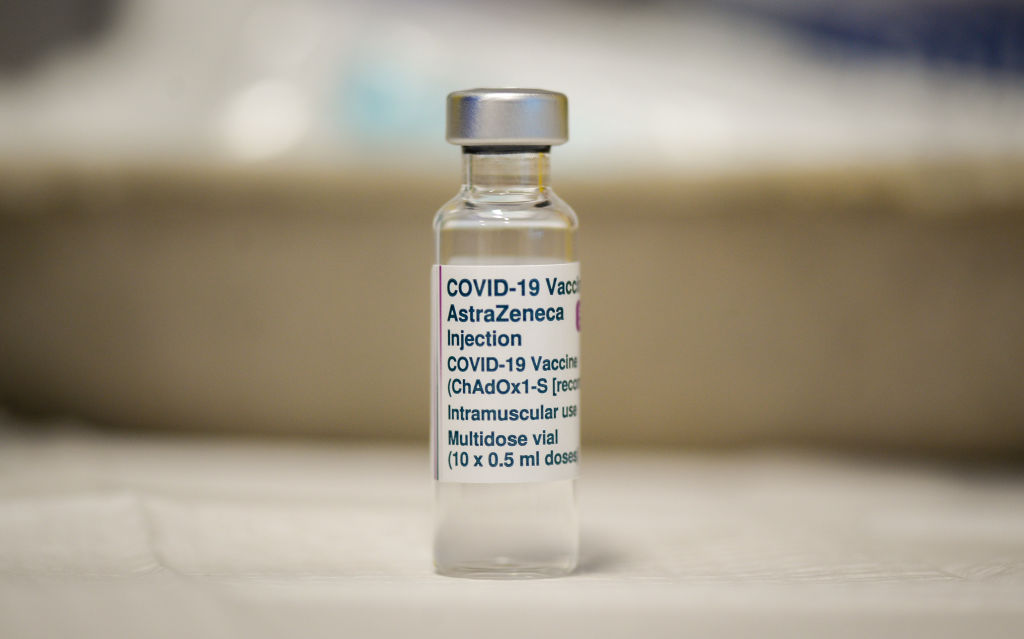
The AstraZeneca Covid-19 vaccine that is now cleared for use in more than 70 countries now has the pivotal clinical trial data that could make the shots available in the U.S.
AstraZeneca reported preliminary Phase 3 data on Monday showing that its vaccine was 79% effective at preventing Covid-19 infection. The Cambridge, U.K.-based pharmaceutical giant added that the shots were 100% effective at preventing severe disease and hospitalization.
However, it’s unclear how well the vaccine works against the new variants of the novel coronavirus that are now circulating throughout the world. Last week, results published in the New England Journal of Medicine from a Phase 1b/2 study testing the two-shot regimen showed that the vaccine did not protect against mild-to-moderate disease from the variant that first emerged in South Africa. Clinical tests of Johnson & Johnson’s Covid vaccine showed reduced efficacy against that variant. The messenger RNA vaccines from Modena and partners Pfizer and BioNTech were completed before the variant from South Africa was identified.
The data AstraZeneca released Monday offered no details about its shot’s performance against any variants. Nonetheless, the company said that based on its Phase 3 data, it is preparing to submit a request for FDA emergency use authorization.
The AstraZeneca Covid-19 vaccine was co-invented by the University of Oxford and Vaccitech, a spinout company from the university. AstraZeneca licensed the vaccine from the university last April. The vaccine is based on a version of adenovirus, which causes the common cold in chimpanzees. That virus, weakened so it cannot replicate, serves as a vehicle to ferry into cells the genetic material for the spike protein of the novel coronavirus. Cells use that genetic material as the blueprint for making copies of the spike protein, which in turn prompt the immune system to produce antibodies.

A Deep-dive Into Specialty Pharma
A specialty drug is a class of prescription medications used to treat complex, chronic or rare medical conditions. Although this classification was originally intended to define the treatment of rare, also termed “orphan” diseases, affecting fewer than 200,000 people in the US, more recently, specialty drugs have emerged as the cornerstone of treatment for chronic and complex diseases such as cancer, autoimmune conditions, diabetes, hepatitis C, and HIV/AIDS.
The AstraZeneca vaccine, given the place holder name AZD12222, was tested in a double-blind Phase 3 study that enrolled 32,449 adults in the U.S., Peru, and Chile. Participants were randomly assigned to receive the vaccine or a placebo in two doses given four weeks apart. In addition to achieving 79% efficacy, the data also point to a robust effect in the elderly. AstraZeneca said that efficacy in those 65 and older was more than 80%.
“These findings reconfirm previous results observed in AZD1222 trials across all adult populations but it’s exciting to see similar efficacy results in people over 65 for the first time,” Ann Falsey, a professor of medicine at the University of Rochester School of Medicine and co-lead investigator for the trial, said in a prepared statement. “This analysis validates the AstraZeneca Covid-19 vaccine as a much-needed additional vaccination option, offering confidence that adults of all ages can benefit from protection against the virus.”
The results also allay some concerns about the vaccine’s association with blood clotting. In recent weeks, clotting problems were reported in a small number of patients, leading a number of European countries to suspend use of the vaccine. Last Thursday, the European Medicines Agency said that its preliminary review found no association between the clotting events and the vaccine. It added that the vaccine’s benefits outweigh its risks.
AstraZeneca said the independent body monitoring safety for the clinical trial specifically examined the data looking for clotting problems, including clots in the brain, with help from an independent neurologist. That review found no risk of blood clotting problems in the 21,583 study participants who received at least one dose of the AstraZeneca shot. The company added that a specific search for blood clotting in the brain found no such problems.
The AstraZeneca vaccine is seen as crucial to achieving vaccination throughout the world. Unlike the mRNA vaccines that must be transported and stored at require ultra-cold temperatures, AstraZeneca’s vaccine can be stored at typical refrigerator temperatures of 36 to 46 degrees Fahrenheit (2 to 8 degrees Celsius) for at least six months. The vaccine also does not require clinicians to undertake any special steps to prepare the shot.
More than 70 countries have granted conditional marketing authorization or emergency use authorization to the AstraZeneca vaccine. It also has an emergency use listing from the World Health Organization, a classification that speeds up the pathway toward access in up to 142 countries through COVAX, the global coalition aimed at equitable access to Covid vaccination throughout the world.
AstraZeneca conducted the Phase 3 test with support from the U.S. Biomedical Advanced Research and Development Authority, which has provided more than $1 billion in funding for the vaccine, including its clinical development. The company said it would file a request for FDA emergency use authorization in coming weeks. As it is preparing the submission, AstraZeneca will also submit the early analysis of the Phase 3 data for publication in a peer-reviewed scientific journal.
Photo: Finnbarr Webster,Getty Images













